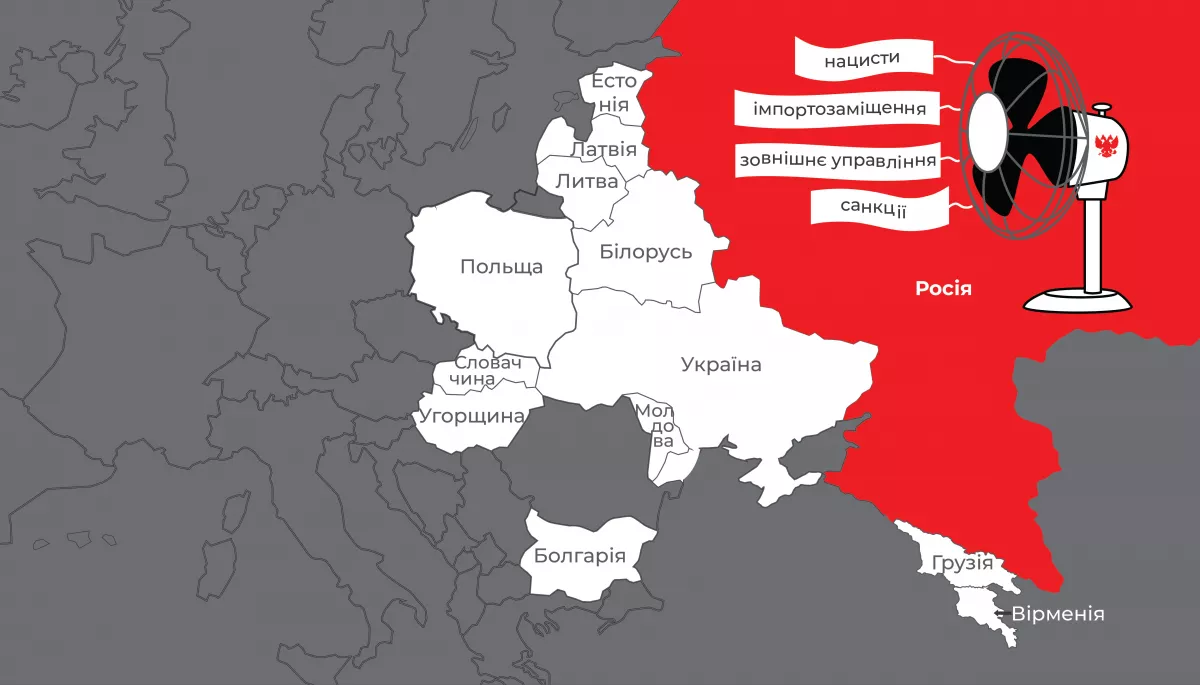

In March-April 2023, analysts of the Detector Media Research Center took part in a joint project with representatives of ten other teams from Belarus, Bulgaria, Armenia, Georgia, Moldova, Poland, Slovakia, Hungary, Ukraine, and the Baltic States to identify Russian propaganda, which spreads in the media and social networks of these countries. Detector Media analysts studied the data from joint monitoring and prepared research on Russian disinformation messages and narratives in Eastern European countries.
Detector Media’s analytical team members have previously participated in disinformation monitoring, which was carried out under joint activities in several states at the same time. Such monitoring helps compare what messages Russian propagandists promote to different audiences.
Research Methodology
The difference in this monitoring is that this time in each country, there was a fixed number of messages from a predetermined set of sources, the publications of which were prepared by the LetsData team.
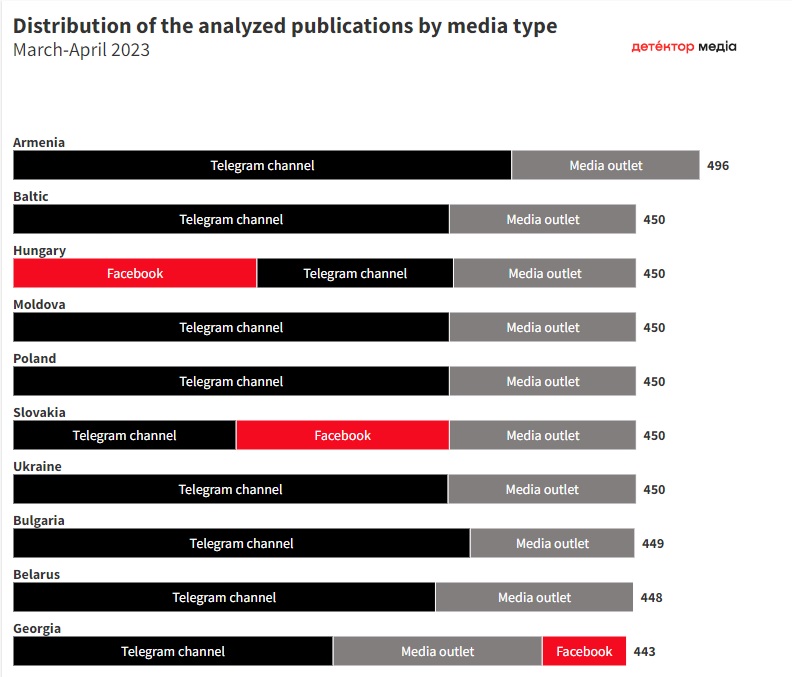
A random selection of publications from Facebook, Telegram, and individual media was used to avoid the research results distortion, when representatives of organizations that constantly work with disinformation would single out publications with messages they are familiar with and deliberately omit those where the propaganda messages are more difficult to be determined.
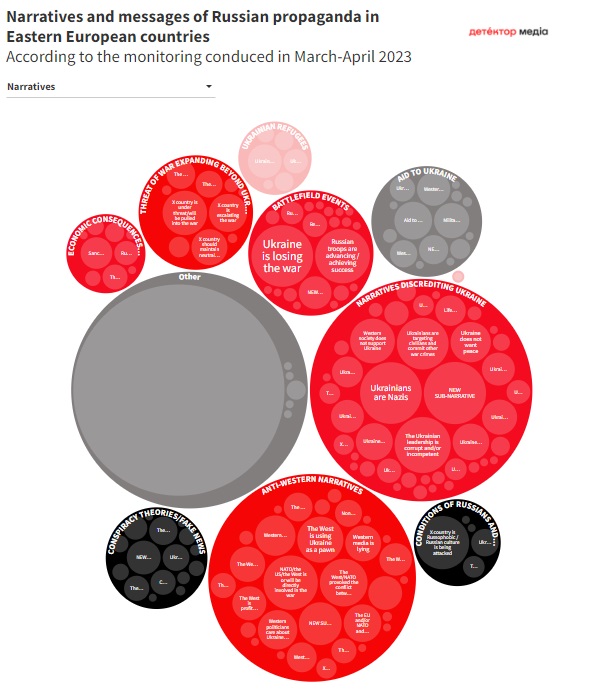
If a post that did not contain a propagandist message was included in the analysis sample, based on the opinion of the analysts from the respective country, it was marked as "Other". There were 42% of such posts in the entire set of posts for analysis. For readers from Ukraine, "Other" messages are helpful because they can help to better understand what propaganda resources are spreading in the countries participating in the project. Likewise, messages considered propaganda in Ukraine are not considered so by representatives of other countries. Generally, the narratives and messages from the publications with which analysts from 11 countries worked fit the classic set of theses used by Russian propagandists in Ukraine and abroad. These include: accusing others of Russophobia, complaining about the aggressiveness of EU and NATO members, exaggerating Russia's successes on the front in Ukraine, spreading conspiracy theories, etc.
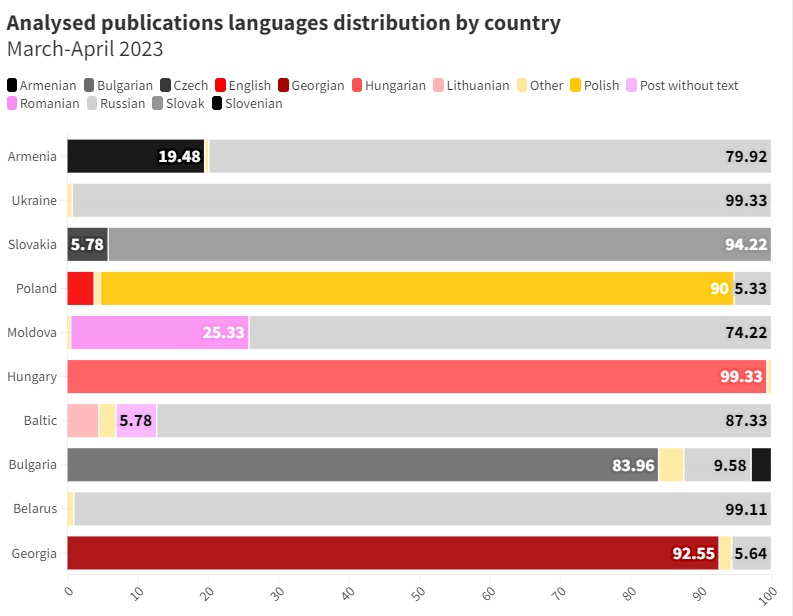
Most of the publications included in the sample were written in Russian. Publications in this language make up 46% of the total posts. The Russian language dominates in posts from countries that were part of the USSR, except for Georgia. In the rest of the nations, the Russian language for posting is relatively rare, where publications in local state languages prevail.
Belarus
In July 2024, it will be thirty years since Alexander Lukashenko ruled the Republic of Belarus. Lukashenko remains in power due to the security forces and media’s loyalty to him and Russia's support for his regime. This long-term rule of the country by a dictator dependent on Russia has led to opposition politicians and media not operating fully. Meanwhile, the information policy of the pro-government media is consistent with the Russian agenda. It is confirmed by the data of a two-month monitoring of the Belarusian media, where the main topics of the messages are the discreditation of Ukraine, criticism of the West, and exaggeration of the Russian troops’ successes on the battlefield.
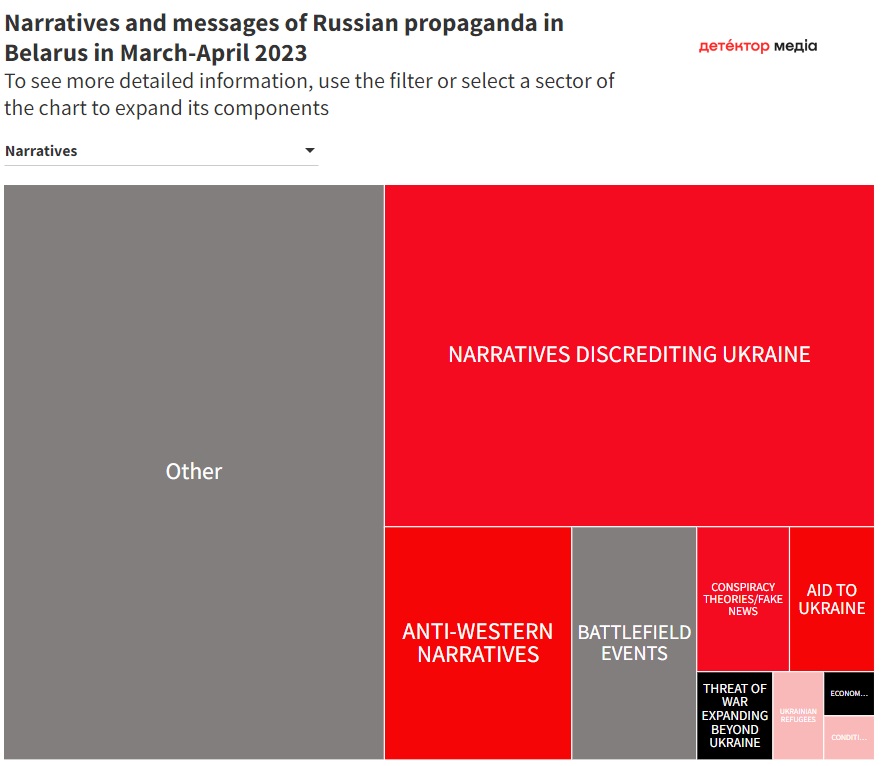
In the data set with which colleagues from Belarus worked, apart from the traditional Russian messages about "Ukrainian Nazis" and "puppets of the West", topics adapted to the local audience have been added simultaneously. For example, news on NATO or Ukraine planning an invasion of Belarus, factual or fabricated news from the regions of Ukraine bordering Belarus is being spread to lock in the Russian agitprop image of Ukrainians as Nazis. Throughout the analyzed period, we have also seen a post from a confectionery company in Zhytomyr, which apparently bakes inspired by photos crackers in the shapes of Russian soldiers inspired by photos killed in Ukraine.
Bulgaria
In a sample of posts from Bulgarian media and social networks, the most common were anti-Western narratives used by Russian propaganda. In particular, it was reported that NATO, the USA, or the "collective West" are participating in the war against Russia on the side of Ukraine. For example, the posts stated that the United States was supplying weapons to Ukraine, thereby worsening the armed conflict.
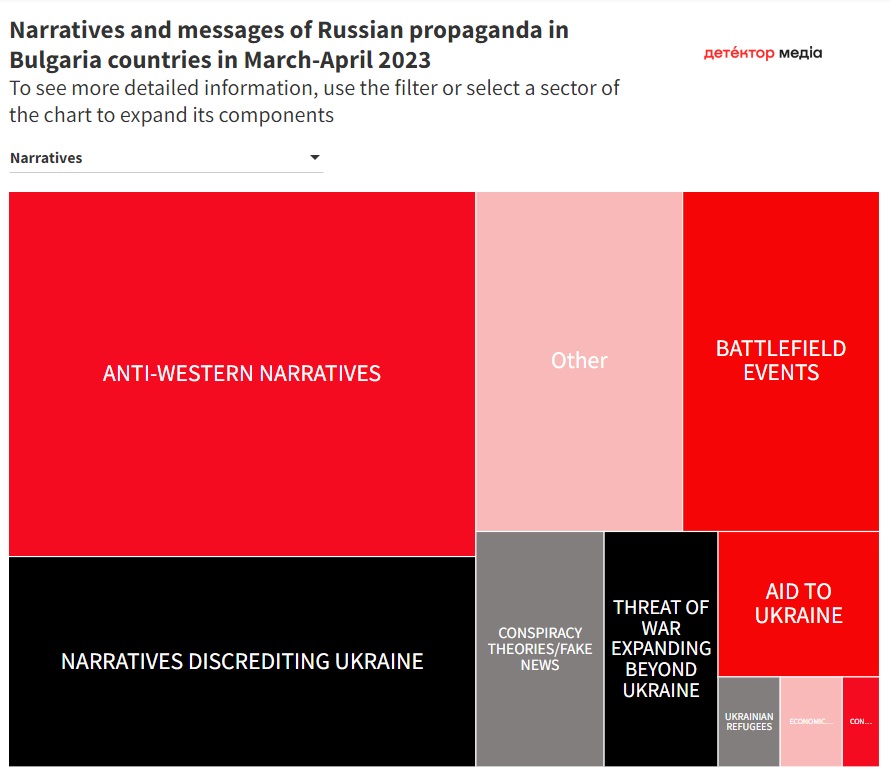
Among the sample of publications from the Bulgarian media and social networks were also messages that discredited the national communities, attributing them to the involvement in Russia's war against Ukraine. Bulgarian analysts particularly paid attention to anti-Semitic rhetoric in Telegram channels. In particular, pro-Russian social network users presented the demarche of the Israeli delegation at the UN during the speech of Russian Foreign Minister Sergei Lavrov as "the unwillingness of those who benefit from war in Ukraine to listen to the representative of Russia." Detector Media has already written about the use of Russian agitprop to discredit national communities, as well as about the anti-Semitic rhetoric of propagandists.
Armenia
In a sample of posts from Armenian Telegram channels and media, the most reported ones were about NATO and EU states inciting a military conflict in Ukraine. The views of experts and authors from Russian propaganda publications such as Sputnik, which is under sanctions in Europe, are often cited in Armenia.
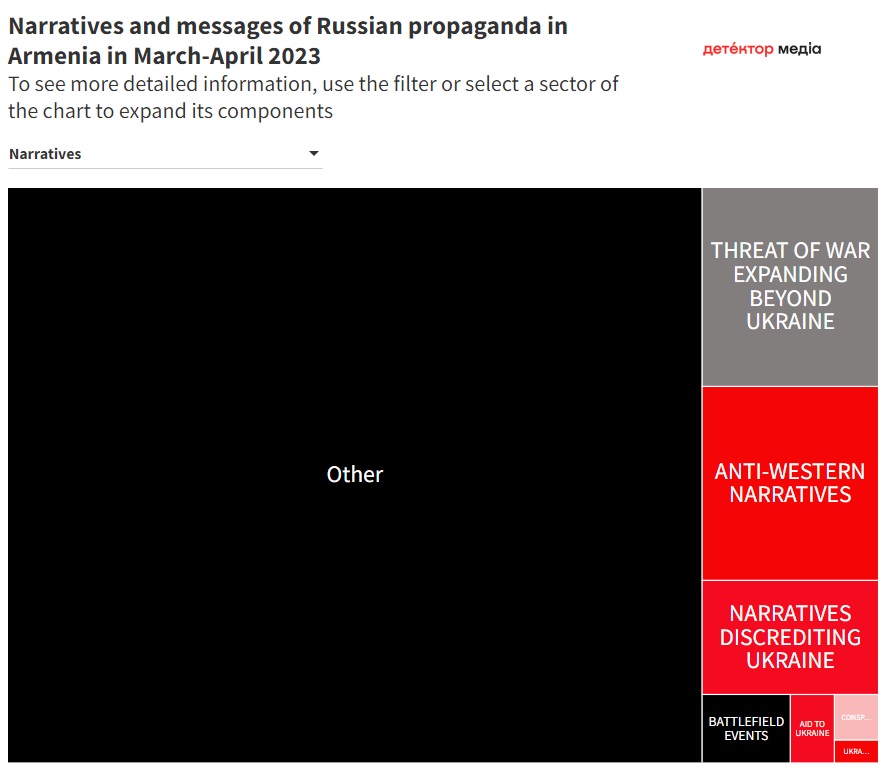
The work of Russian propaganda resources in Armenia makes it easier for Russian propagandists to promote their messages that other states should maintain neutrality to avoid becoming complicit in the aggression of NATO, the USA, or the EU and not to worsen their relations with Russia.
Georgia
In the sample of Georgian media, the most significant number of posted messages are about the threat of Georgia’s "external governance" by other states or international organizations. As in Ukraine, propaganda Telegram channels and media say that representatives of foreign-funded public organizations are organizing protests in Georgia or even preparing a coup to force the Georgian authorities to give more concessions to the West.
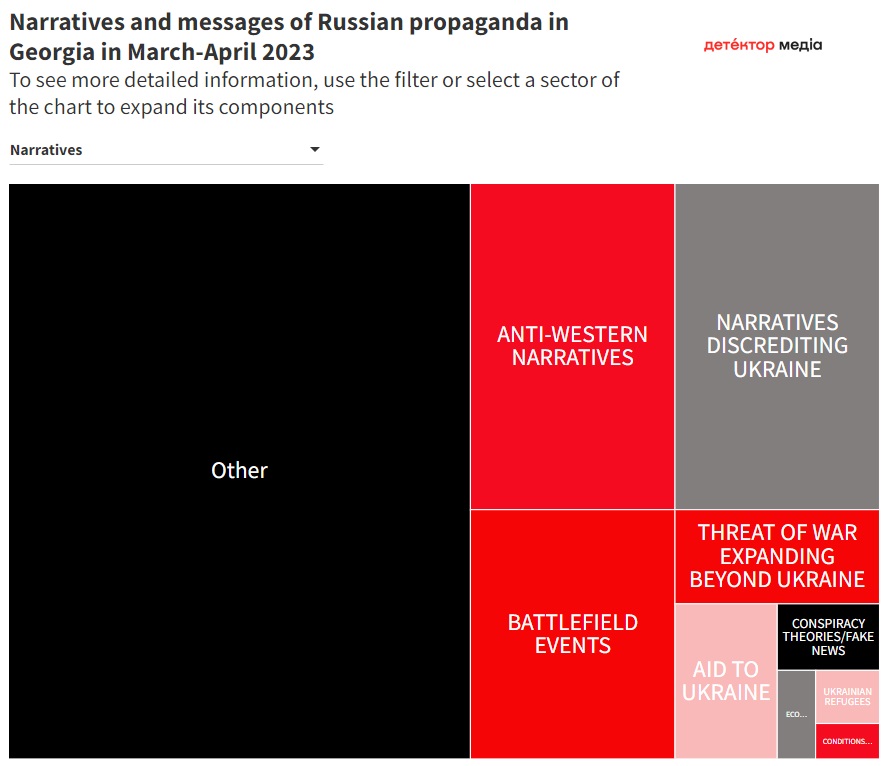
In reports that Ukraine is losing the war, Georgian pro-Russian authors most often used the "third person" propaganda tactic — interpreting beneficial to Russia Washington Post’s articles, English-language bloggers, or "American intelligence. Occasionally, pro-Russian publications and experts, such as the local TV Obieqtivi, or pro-Russian bloggers, such as Beka Vardosanidze, who regularly spreads Russian disinformation in Georgia, became the sources of posts about the inevitable loss of Ukraine in the war. The primary purpose of such publications is to convince their consumers that Russia is doing everything right, and independent sources confirm its successes.
Baltic countries
A sample of publications from the Telegram channels in Lithuania, Latvia, and Estonia contained the most messages regarding the fact that certain states are Russophobic and oppress Russian culture. A significant Russian community lives in the Baltic countries, particularly in Latvia and Estonia, so many disinformation messages are aimed at a pro-Russian audience from these countries. In particular, our colleagues from the Baltic countries recorded messages that accused the governments of Lithuania, Latvia, and Estonia of Russophobia and support for "Ukrainian Nazis". In particular, it related to banning Russians from entering the territory of these countries and labeling Baltic politicians or historical figures as "traditional Nazis who hate Russians". You can read more about the "Ukrainians are Nazis" propaganda message here.
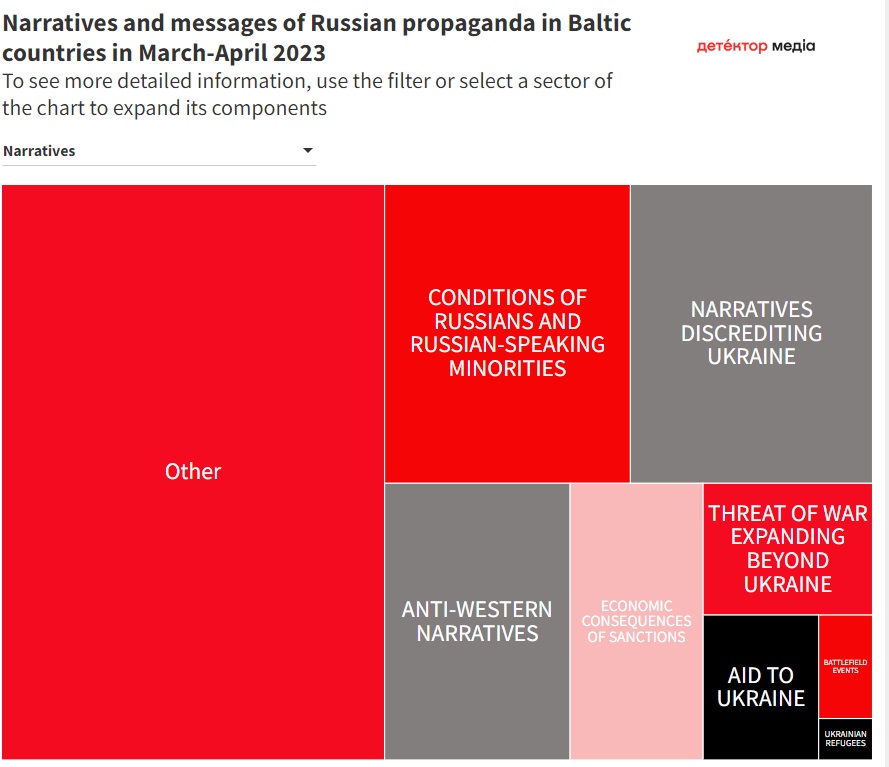
Russian propagandists working in the Baltic countries are trying to demonize the non-pro-Russian citizens of these countries. One example is an anonymous Telegram channel message quoting a letter allegedly from a Latvian prison. It was apparently written by someone the channel's administrators consider a "prisoner of conscience". The letter states that "the majority of Latvians did not save Jews during the Second World War, but killed them. Volodymyr Zelenskyi also betrayed the memory of his Jewish ancestors." We have already written that agitprop regularly promotes messages that Ukrainians or representatives of other countries are Nazis, "Nazi Jews", or "anti-Semites". The purpose of these messages is to establish in the minds of propaganda consumers a hostile attitude towards specific national communities or their representatives.
Moldova
Propagandist media in Moldova focus on events that may indicate that Ukraine or other neighbors of Moldova are preparing to invade Moldova itself or the so-called Transnistria, where Russian proteges have been in power since 1992. Propagandist media believe that the Ukrainian military can invade Transnistria while Romania would occupy Moldova.
In the publications included in the sample, in addition to its "aggressiveness", Ukraine appears as a Russophobic country, where the military allegedly forces priests to speak Ukrainian and persecutes the "canonical Orthodox Church".
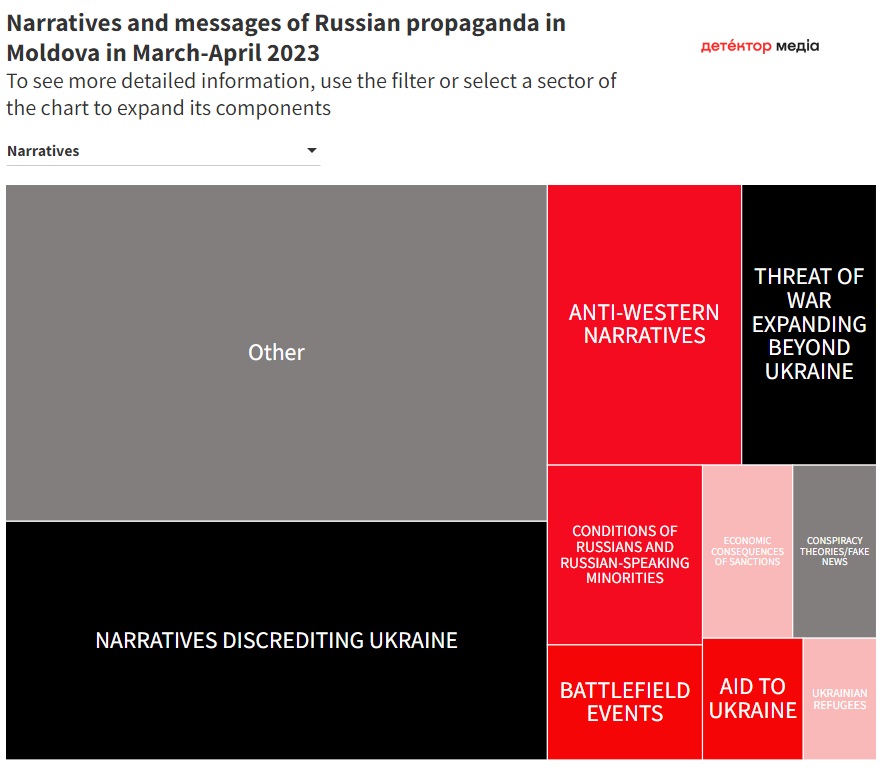
When propagandist Telegram channels and media write about the internal politics of Moldova, they try to create an impression of the state’s leaders as incompetent and inconsistent. On the one hand, they are constantly discussing the country’s threats from Russia and its internal problems, and on the other hand, these channels are trying to attract investors.
Poland
Poland has traditionally been an object of Russian disinformation. For example, agitprop constantly promotes the message that Poland seeks to occupy the western regions of Ukraine. Such statements help propagandists to accuse others of planning military aggression and divert attention from the ongoing Russian aggression.
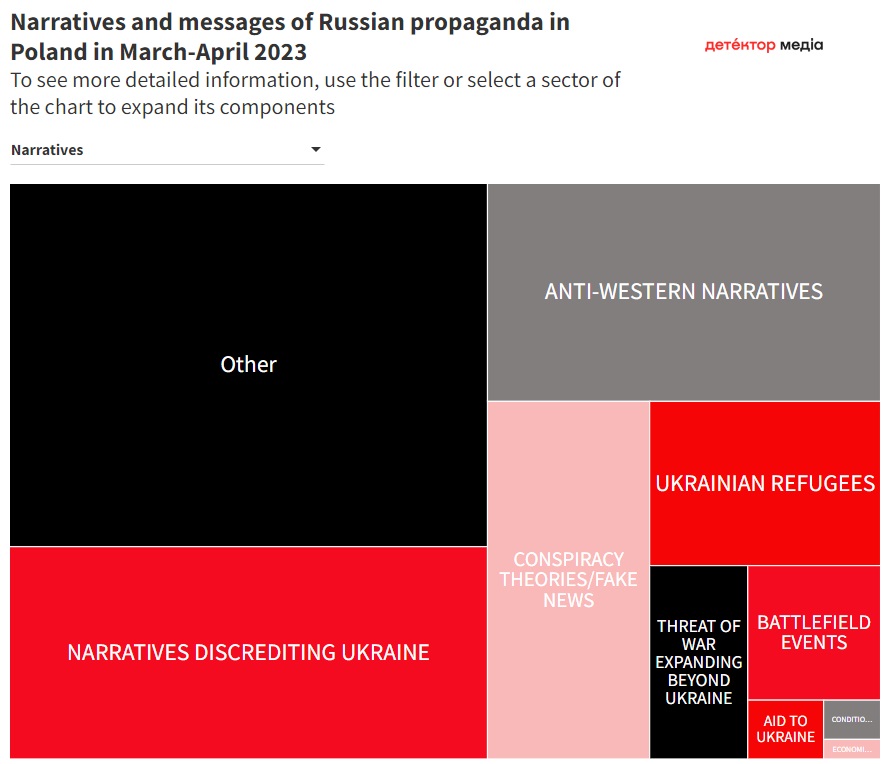
A sample of Telegram channels from Poland contained many references to Russian agitprop narratives associated with conspiracy theories. In particular, Russia's war against Ukraine is part of a "global plan". Moreover, the Polish media spread the message that Russia's war against Ukraine is a conspiracy by Western powers to resettle Ukrainians throughout Europe and distribute the economic expansion of Ukrainian companies. The opening of a number of new "Nova Post" branches in Poland was cited as such an example. Such messages may find support among Polish citizens and residents of other EU states, who consider the unimpeded access of Ukrainians to their markets a threat.
Slovakia
In the set of publications from Slovakia, the most common accusations of NATO are that the bloc facilitates the killing of civilians and helps Ukraine to the detriment of its own interests. In these publications, propagandists strengthen the polemics of Slovak politicians and opinion leaders who oppose helping Ukraine.
The characteristics of Ukrainians in the publications included in the sample of Slovak media fit into the image created by Russian propaganda: "ill-mannered refugees", "puppets of the West", "Nazis", and life is better in "territories liberated from the Nazis".
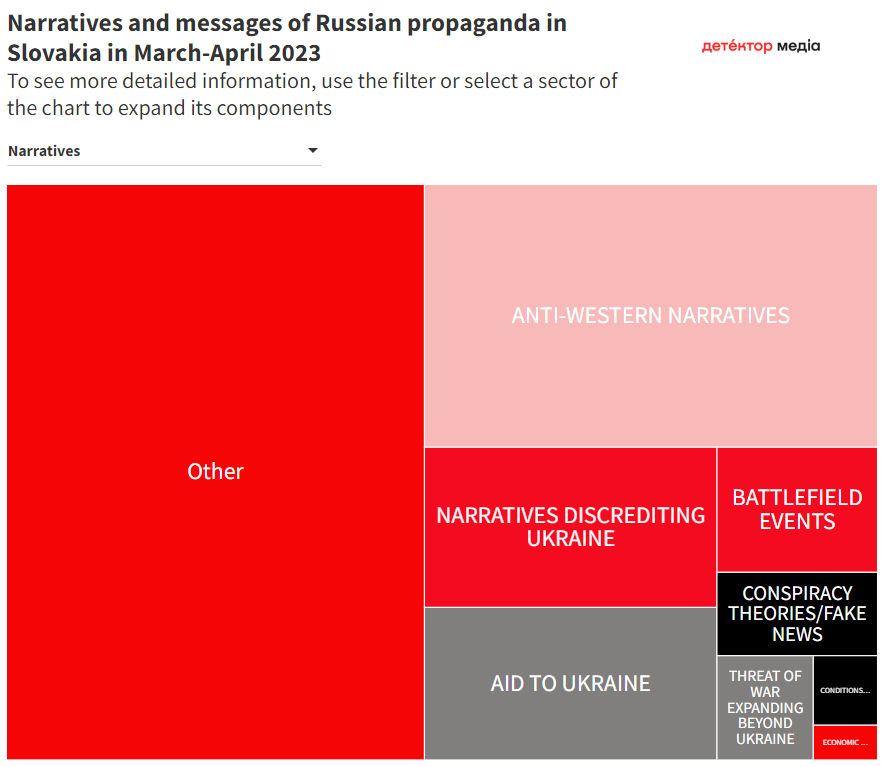
In contrast to Ukraine's neighbors, which were part of the USSR, publications with information that grain from Ukraine contained substances banned in Europe had been spread in Slovakia. It happened after the import of Ukrainian grain was banned in Poland.
Among the publications, which Slovak colleagues did not label as propaganda, were quotes from Russian experts and officials that transferring MIG-29 aircraft (Fulcrum) to Ukraine violates international law.
Hungary
Against the backdrop of complex diplomatic relations between Ukraine and Hungary, the Russian propaganda machine is spreading disinformation messages about the Hungarian community in Ukraine. A selection of Hungarian Telegram channels contained many statements spreading Russian disinformation that Ukraine would lose the war. Hungarian media and pro-Russian social media users have frequently quoted Russian politicians and propagandists, as well as journalists and public figures who promote pro-Russian narratives, including William Scott Ritter, a former UN official and Putin’s proponent, and Seymour Hersh, an American journalist, and critic of US politics.
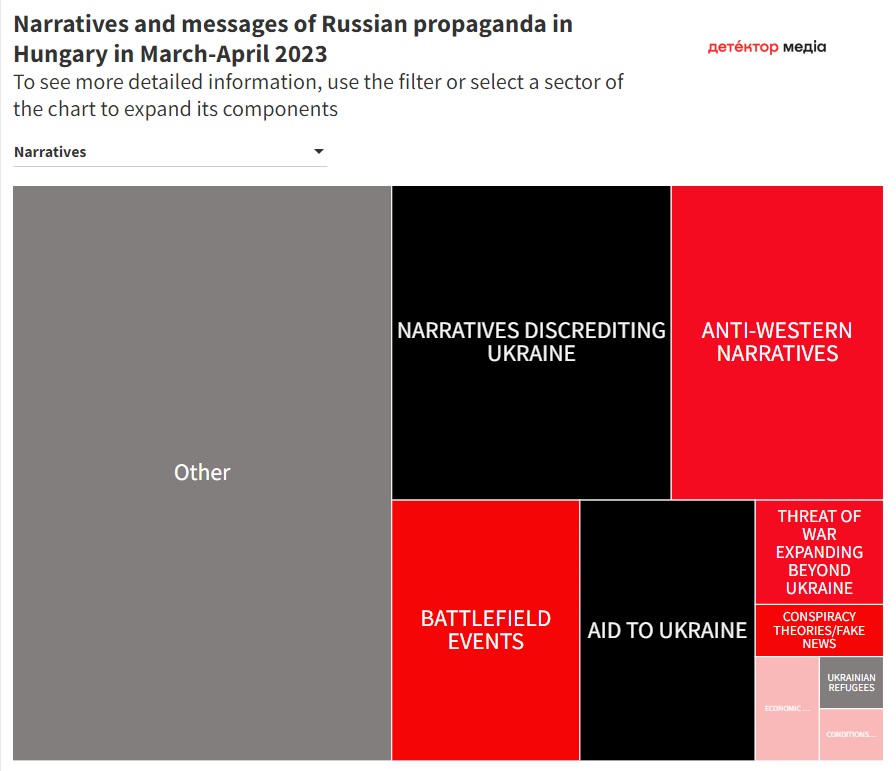
Hungarian colleagues marked specific messages as ones not containing disinformation. For example, an anonymous Telegram channel spread a fake that Ukrainian military officer Viktor Pylypenko, who declared his homosexuality, is allegedly "the leader of an LGBT unit within the Armed Forces of Ukraine, and also organizes gay orgies." Detector Media’s analysts would mark this message as disinformation since fakes about the alleged creation of "LGBT units" in the Ukrainian army are spread by Russia occasionally to discredit the Ukrainian authorities. You can read more about how Russian propaganda uses the LGBT+ topic to discredit Ukraine here and here.
Conclusions
Propaganda messages analyzed in these countries are primarily based on the already-known Russian disinformation messages. They fit into several groups: discrediting Ukraine; messages about the harm of aid to Ukraine for peace and well-being; stigmatizing of Ukrainian refugees; threats of spreading the war beyond the borders of Ukraine; discrediting the USA, EU, and NATO members; proving Russia's invulnerability to sanctions; accusing others of Russophobia; spreading conspiracy theories and fakes. Propagandists most often adapt these theses to information purposes common in each of the countries or popular in the international media.
A set of messages are prepared in advance, and the ability to quickly distribute them in social networks allows propagandists to become one of the first to interpret the events. The main danger from the frequent use of such pre-prepared messages is that, from their constant repetition, they begin to be perceived as axioms, accepted in society by presumption, and no one suggests questioning them. Accordingly, other messages containing already learned statements can be applied to representatives of societies with particular propaganda messages.
With these messages, Russia is trying to discredit the Ukrainian government and army, devalue the achievements and successes of Ukrainians, sow distrust and fear among the recipient states' citizens, and compromise Ukraine's power structures in the eyes of Western partners. In this way, Russian agitprop tries to reduce the level of support for "pro-Ukrainian" political forces in European countries and accordingly achieve a hypothetical change of loyal to Russian power in these states. This strategy is aimed at splitting Ukraine's allies and reducing the level of military and financial support for Ukraine, which could lead to a slowdown in the military success of the Defense Forces of Ukraine at the front and Ukraine’s economic stagnation.
The penetration of propaganda into people's heads in some of the countries under study, such as Armenia, is facilitated by the ongoing work of the websites, Telegram channels, Facebook pages, Instagram, VK, and OK, managed by the Russian propaganda publication Sputnik. According to Telemetrio, one of these pages is even among the top ten Telegram channels in the Armenian segment of Telegram. The existence of such resources, which work aimed at the audience of social networks of individual countries, brings the issue of combating disinformation beyond the capabilities of civil society. After all, the cooperation of social networks with resources that spread misinformation is regulated by states, and civil society can only draw their [states] attention to issues and offer solutions.

